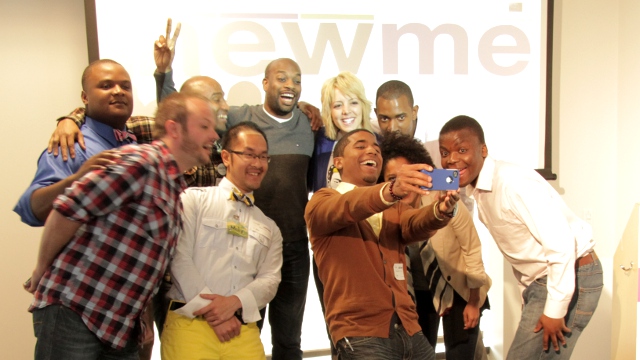Chris Lyons, from Johns Creek Georgia, is one of the participants. Like a lot of people in Silicon Valley, he seems almost predestined for entrepreneurship. When he was 12, he started mowing lawns.
Interactive news package designed by C.K. Hickey, using photos taken by Joshua Cassidy.
“I would push my lawn mower up and down the hill with one hand and carry the rolling trash can for the other,” says Lyons. “I had over 30 lawns. Then I bought a John Deere tractor. By the time I was 16, I had two employees.”
Now, someone like this isn’t going to stay in John’s Creek forever. By the time he was 25, Lyons had set his sights on Silicon Valley. “I want to be in an area that nurtures strong willed, forward thinking, individuals,” he says. “And there's no better place than Silicon Valley or San Francisco.”
"It’s about how our brains are wired."
But when you look at Silicon Valley, especially at people who are starting businesses, few of them look like Chris Lyons, who is black. And that fact tends to perpetuate itself, says venture capitalist and diversity consultant Freada Kapor Klein.
“This isn’t about being bigots, says Klein. “It isn’t about who’s mean spirited and who’s enlightened. It’s about how our brains are wired.”
Klein says it’s human nature: People tend to help people who look like them, and who come from the same backgrounds. She says it’s largely unconscious. “We’re not even aware of that hurdle we’ve put in the place of a different kind of entrepreneur.”
That’s why Klein and her husband, Mitch Kapor, are among the supporters for the NewME accelerator. Its founder and CEO is Angela Benton.
For three months, seven “founders” as they’re called, shared a four-bedroom house in San Francisco’s Inner Sunset neighborhood.
“Like Real World for geeks,” said Rachel Brooks, a stylish 25-year old from Chicago.
Each of the founders has a business.
Chris Lyons is the founder of PictureMenu, which helps restaurants put their menus online. Rachel's company, Citizen Made lets online merchants make their products customizable.
(See the interactive photos above for more about each of the founders’ companies.)
Freada Kapor Klein says the NewME program is a two-way street. Without diversity, she says, the industry – and the rest of us – miss out.
“If we've got a very insular world, then the kinds of companies that are created will most scratch the itch of a particular set of people, and ignore everyone else,” says Klein.
Roadblocks to diversity
One major source of Silicon Valley’s homogeneity is what’s called the pipeline issue. There just aren’t a lot of women, African Americans, and Latinos enrolling in science and engineering programs, which are the fields that typically lead to technology success.
But there are subtler forces at work, too, says Chris Bennett, a NewME alum and entrepreneur who helped start Black Founders, a group based in San Francisco.
“No one’s going say ‘I’m not going to fund you because you’re black,’” says Bennett. “But I do know, from talking to investors and entrepreneurs, black and white, everyone will tell you that there’s a bias.”
Nnena Ukuku, an attorney who advises start-ups, and fellow Black Founders member, calls it “a chicken-and-egg issue.”
“Some people have never seen a successful black entrepreneur,” she says, “so they can’t envision it. But the [black entpreneurs] are out there. It’s a mess!”
A mess, she means, because tangled up in all of this are the roadblocks that women and people of color often put in front of themselves.
“That’s a much deeper issue,” says Ukuku, laughing.
Ukuku says one thing she hears all the time from women and minority entrepreneurs is that they feel like they have to outshine everyone else, just to deserve a place here.
“Whereas I’ll talk to some of my friends, who I adore, who don’t fit into one of those two buckets and they’ll say: ‘I got an idea. I’m going for it!’”
Ukuku says it’s the same kind of confidence that she sees in her own relatives back in Nigeria.
“They’re the majority in that culture,” she says. “There’s just an assumption that you’ll succeed. Like, why wouldn’t you?”
Pitch day
It’s that kind of confidence that Chris Lyons and the other founders were trying to cultivate on Day Two of NewME, which took place at Google headquarters in Mountain View.
It was every bit the dot-com fantasy they expected.
“I just walked outside and they’re playing pool, and drinking coffee,” marvels Chris Lyons, giddily. “And I saw a yoga session when we walked in here!”
But he’s nervous too. Tonight is a bit of an initiation. It’s the founders’ first pitch session. Each will have two minutes to present his or her company to a room of 150 or so people, including six critics in the “Dragons' Den,” who will critique the pitches onstage.
Chris Lyons is last on the list. He flashes a huge smile. “How’s everyone doing today?” he begins.
His pitch starts out pretty strong, with a succinct description of pictureMENU and what it will offer restaurants. But then it gets a little muddy, with vague descriptions of features that will eventually be offered.
"It was a great first half, then it went off the rails,” says Chris Genteel, Development Manager for Global Diversity at Google, is one of the judges. “I didn’t get a sense of the one problem you’re trying to solve.”
